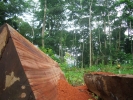 The Congo basin region makes up one fourth of the world's remaining tropical forests and houses a wealth of environmental, economical, and social goods and services. Governance, corruption, land tenure, and indigenous peoples rights are all contentious issues surrounding the basin area's forest resources. REDD provides a way of mitigating climate and addressing issues of governance surrounding deforestation. Pilot programs established such as the FCPF, UNREDD, and other partnership programs have had limited coordination because of differing views on indigenous involvement. Global Climate Politics in the Congo Basin: Unprecedented Opportunity or High-risk Gamble? is the report written by Korinna Horta of Development and Environment, for the Heinrich B__ll Foundation.
The Congo basin region makes up one fourth of the world's remaining tropical forests and houses a wealth of environmental, economical, and social goods and services. Governance, corruption, land tenure, and indigenous peoples rights are all contentious issues surrounding the basin area's forest resources. REDD provides a way of mitigating climate and addressing issues of governance surrounding deforestation. Pilot programs established such as the FCPF, UNREDD, and other partnership programs have had limited coordination because of differing views on indigenous involvement. Global Climate Politics in the Congo Basin: Unprecedented Opportunity or High-risk Gamble? is the report written by Korinna Horta of Development and Environment, for the Heinrich B__ll Foundation.
Horta highlighted the importance of ensuring equitable distribution of REDD benefits. The funds could fall in the hands of illegal industrial loggers if policies aren't in place instead of benefiting the greater Congolese people.
The destruction of tropical forests contributes between 15-20 percent of the greenhouse gases generated by human activity. Thus, initiatives to reduce deforestation and the degradation of forests - known by the acronym REDD (United Nations Collaborative Programme on Reducing Emissions from Deforestation and Forest Degradation in Developing Countries) - are considered to be vital if unacceptable risks of dangerous climate change are to be avoided.
The idea is that compensating developing countries for slowing their rates of deforestation represents cost-effective and near-term opportunities that would not only help protect the world's climate, but also generate a host of co-benefits, such as the conservation of biodiversity and generation of income for economic development. The Congo Basin forest - the second largest in the world after the Amazon - covers 700,000 square miles in six countries and contains a quarter of the world's remaining tropical forest.
Donor governments consider Congo Basin countries, including the Democratic Republic of Congo, the Republic of Congo, Cameroon, Gabon, and others, to be prime candidates for REDD, and national governments in the region are eager to seize the opportunity. Multiple REDD-related initiatives have already been launched in several Congo Basin countries, all of which have substantial deficits when it comes to governance and respect for human rights. REDD opens up political space to address questions of governance, corruption, land tenure, and the rights of indigenous peoples. If REDD is to succeed, it will have to make progress on these complex political and social problems. Unless governments in the region commit to effective reforms, the risks represented by an implementation of REDD include massive land speculation, eviction of indigenous and other forest-dependent populations, loss of traditional knowledge systems, and outright fraud and corruption as vested interests seek to cash in on lucrative carbon deals. Last but not least, there would be further increases in CO2 emissions, as ill-conceived schemes to protect forests are likely to fail.


